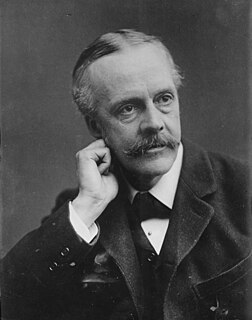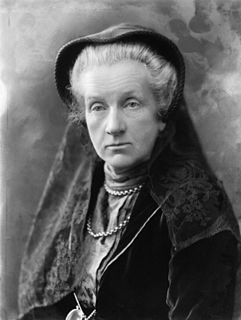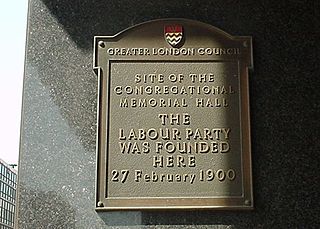
Arthur James Balfour, 1st Earl of Balfour,, also known as Lord Balfour, was a British Conservative statesman who served as Prime Minister of the United Kingdom from 1902 to 1905. As foreign secretary in the Lloyd George ministry, he issued the Balfour Declaration in 1917 on behalf of the cabinet.

Arthur Cecil Pigou was an English economist. As a teacher and builder of the School of Economics at the University of Cambridge, he trained and influenced many Cambridge economists who went on to take chairs of economics around the world. His work covered various fields of economics, particularly welfare economics, but also included Business cycle theory, unemployment, public finance, index numbers, and measurement of national output. His reputation was affected adversely by influential economic writers who used his work as the basis on which to define their own opposing views. He reluctantly served on several public committees, including the Cunliffe Committee and the 1919 Royal Commission on Income tax.

William Henry Beveridge, 1st Baron Beveridge, was a British economist and Liberal politician who was a progressive and social reformer who played a central role in designing the British welfare state. His 1942 report Social Insurance and Allied Services served as the basis for the welfare state put in place by the Labour government elected in 1945.
The Soil Association is a charity based in the United Kingdom. Founded in 1946, its activities include campaign work on issues including opposition to intensive farming, support for local purchasing and public education on nutrition; as well the certification of organic food.

The 1906 United Kingdom general election was held from 12 January to 8 February 1906.

The Dominion of Newfoundland was a country in eastern North America, today the modern Canadian province of Newfoundland and Labrador. It was established on 26 September 1907, and confirmed by the Balfour Declaration of 1926 and the Statute of Westminster of 1931. It included the island of Newfoundland, and Labrador on the continental mainland. Newfoundland was one of the original "dominions" within the meaning of the Balfour Declaration and accordingly enjoyed a constitutional status equivalent to the other dominions of the time.

Economic sociology is the study of the social cause and effect of various economic phenomena. The field can be broadly divided into a classical period and a contemporary one, known as "New economic sociology".

The economy of India is characterised as a middle income developing market economy. It is the world's sixth-largest economy by nominal GDP and the third-largest by purchasing power parity (PPP). According to the International Monetary Fund (IMF), on a per capita income basis, India ranked 145th by GDP (nominal) and 122th by GDP (PPP). From independence in 1947 until 1991, successive governments promoted protectionist economic policies, with extensive state intervention and economic regulation. This is characterised as dirigism, in the form of the License Raj. The end of the Cold War and an acute balance of payments crisis in 1991 led to the adoption of a broad economic liberalisation in India. Since the start of the 21st century, annual average GDP growth has been 6% to 7%, and from 2013 to 2018, India was the world's fastest growing major economy, surpassing China. Historically, India was the largest economy in the world for most of the two millennia from the 1st until the 19th century.
The Committee of Imperial Defence was an important ad hoc part of the Government of the United Kingdom and the British Empire from just after the Second Boer War until the start of the Second World War. It was responsible for research, and some co-ordination, on issues of military strategy.

The Geological Survey of India (GSI) is a scientific agency of India. It was founded in 1851, is a Government of India Ministry of Mines organisation, one of the oldest of such organisations in the world and the second oldest survey in India after Survey of India, for conducting geological surveys and studies of India, and also as the prime provider of basic earth science information to government, industry and general public, as well as the official participant in steel, coal, metals, cement, power industries and international geoscientific forums.

Sir Franz Arthur Friedrich Schuster was a German-born British physicist known for his work in spectroscopy, electrochemistry, optics, X-radiography and the application of harmonic analysis to physics. Schuster's integral is named after him. He contributed to making the University of Manchester a centre for the study of physics.

Walter George Frank Phillimore, 1st Baron Phillimore,, known as Sir Walter Phillimore, 2nd Baronet, from 1885 to 1918, was a British lawyer and judge.
Arthur Balfour, 1st Baron Riverdale, known as Sir Arthur Balfour from 1923 to 1929 and Sir Arthur Balfour, 1st Baronet, from 1929 to 1935, was a British steel manufacturer.
The Indian economy under the British Raj describes the economy of India during the years of the British Raj, from 1858 to 1947. According to historical GDP estimates by economist Angus Maddison, India's GDP during the British Raj grew in absolute terms but declined in relative share to the world.
The Macmillan Committee, officially known as the Committee on Finance and Industry, was a committee, composed mostly of economists, formed by the British government after the 1929 stock market crash to determine the root causes of the depressed economy of the United Kingdom. The Macmillan Committee was formed in 1929 by Royal Command 3897, and it was tasked with determining whether the contemporary banking and financial system was helping or hindering British trade and industry. Scottish lawyer Hugh Pattison Macmillan was named as its chairman, although due to his lack of economic or financial expertise, he largely "remained in the background". Other members of the committee included Ernest Bevin, Lord Bradbury, R. H. Brand, Theodore Gregory, John Maynard Keynes, and Reginald McKenna.

The Committee on Commercial and Industrial Policy was a British First World War government committee chaired by Lord Balfour of Burleigh from 1916 to 1918. It was appointed to devise recommendations for Britain's postwar economic policies.

Lady Frances Balfour was one of the highest-ranking members of the British aristocracy to assume a leadership role in the Women's suffrage campaign in the United Kingdom. Balfour was a member of the Executive Committee of the National Society for Women's Suffrage from 1896 to 1919. As a non-violent suffragist, she was opposed to the militant actions of the Women's Social and Political Union, whose members were called the suffragettes.

The Labour Representation Committee (LRC) was a pressure group founded in 1900 as an alliance of socialist organisations and trade unions, aimed at increasing representation for labour interests in the Parliament of the United Kingdom. The Labour Party traces its origin to the LRC's foundation.

Arthur and the Acetone (1936) is a satirical playlet by George Bernard Shaw which dramatises an imaginary conversation between the Zionist Chaim Weizmann and the British Foreign Secretary Arthur Balfour, which Shaw presents as the "true" story of how the Balfour Declaration came into being.













